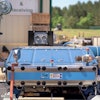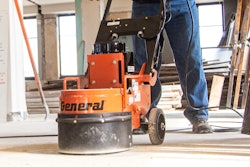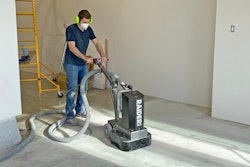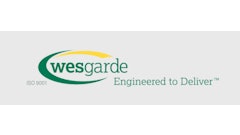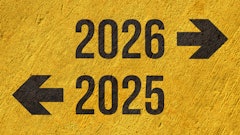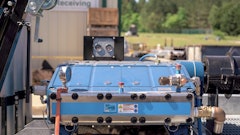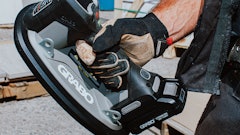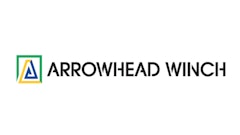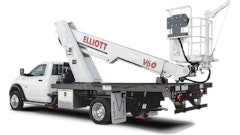Concrete grinders offer a lot of flexibility on a jobsite. They can be used for many different tasks - including removing coatings, roughing up concrete before re-applying a coating, and cleaning surfaces - all on one jobsite. So what's the best way for a rental business to go about selecting the right type of machine for its inventory? Here are the important questions to ask.
Who are your customers?
To have the right equipment for your customers, you first have to understand who your customers are, says Dennis Von Ruden, president of General Equipment Co.
"First and foremost, a rental center operator needs to consider who their customers are," he says. "Not knowing them is a fatal mistake, so it should be the first thing considered before deciding on a concrete grinder ... or any piece of equipment. Are their customers mostly contractors? Big or small? Or are they mostly do-it-yourselfers?"
Brian Wilson, president of WerkMaster concurs. "Are you focusing on the DIY customer, commercial contractor or both?" he says. "Typically, both the DIY and commercial contractor would require a machine for surface preparation, which is the highest demand for concrete grinders in the rental industry.
"The challenge is a machine that would be effective for the small jobs, such as prepping a garage floor for epoxy coatings or leveling a basement floor for hardwood or carpet installation, would be ineffective on a large commercial application," he continues. "Conversely, a machine for commercial use is too large and difficult to be used in a residential application, so they really need to determine what their business model is and who they are trying to appeal to."
Another reason to fully understand your customer base is the experience level they have. A contractor will most likely be more comfortable operating this type of equipment than a DIYer.
"Concrete grinders aren't a cookie-cutter category of equipment," says Von Ruden. "You need to match the machine with the customer's expectations and experience level."
Productivity is also very important to contractors. "Time is money, and they will look for rental stores that provide machines that will allow them to get the desired results quickly," says Wilson. "If they can rent a machine that will grind a floor in one hour versus three or four hours, they will continue to support that rental location."
What do your customers want to do with the machine?
Surface preparation is probably the number one reason both DIYers and commercial contractors rent a concrete grinder. But it's important to understand what your customer base is going to do with the machine so you can have not only the right machine, but accessories and consumables ready for them.
"What do they want to do? What do they want to achieve?" asks Von Ruden. "Customers usually know the end results they're after - they want a nice floor, but they don't necessarily know how to get there. The rental operator needs to understand how to get there so the customer is happy with the results and will become, or continue to be, a return customer."
Where is the machine going to be used and how is the customer going to get it there? Mobility is a key issue, especially for DIY customers. Can they carry the machine by themselves? Will it fit in their trunk? Can they safely get it up and down stairs? Larger machines might need a forklift to load it - does it have lift points? These are all items that need to be considered when selecting a concrete grinder.
What is the power source available?
While smaller grinders are 110-volt, nearly all the commercial grinders require 220-volt electrical supply. They are typically either 220-volt single-phase or 220-volt three-phase. Larger planetary machines require 460-volt three phase power.
"This means a rental business may have to inventory the same machine in two or three electrical iterations to do the same job, significantly increasing their costs and inventory levels," says Wilson. "They would benefit from looking at machines that feature auto-sensing dual sync variable frequency drives that allow the machines to run on both 220 single-phase and/or 220 three-phase, as well as larger machines that can run on 230 volt three-phase and/or 460 three-phase."
Most homes have 15-amp circuits, so renting a larger machine to a DIYer would require a generator. "If looking at a machine running on a 15-amp circuit, then you'll typically be limited to a single-head machine powered by a 1.5-hp electric motor," says Von Ruden.
What kind of ROI are you looking for?
The current economic situation is forcing rental businesses to re-evaluate what machines are going to give them the highest ROI, says Wilson. Some additional questions to ask yourself before investing include:
How many times a week or month will you rent the machine?
What requests have they been receiving for grinding concrete?
Are customers asking for stone or terrazzo applications?
Are you prepared to invest in a single use machine?
"Most rental businesses already have machines for refinishing hardwood, but many will not rent the machines to DIY customers because of the damage they can do to their floors," explains Wilson. "Do you want to fill the needs of only one market segment or do you want a multi-purpose machine to increase their ROI opportunity?
"Would a machine that could be rented as a grinder, polisher, edger, buffer, burnisher or stripper provide your customers with greater opportunities to satisfy their customer needs without increasing their inventory?"
Some of these questions might seem basic, but many times rental businesses don't know the answers until they're asked. "I can't overstress the importance of asking a lot of questions to understand the customer's expectations of the equipment," says Von Ruden. "Matching a customer to the right machine and attachments is key."


